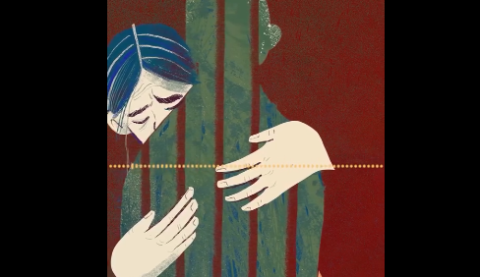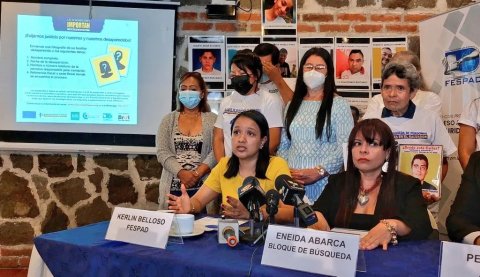
Photo: From a video expressing solidarity with mothers
of the detained and disappeared (Cristosal).

Photo: Press conference in 2022 to denounce and demand
justice for the disappeared (FESPAD).
The state of emergency first declared by the Salvadoran government in March 2022 to curb rampant gang violence has now been repeatedly extended for over two years.
While much of the population supports the measures because of the lower levels of gang violence in certain areas, civil society organizations and families negatively impacted by mass detentions have questioned what the policy has cost in terms of human rights.
Salvadoran human rights organizations have documented at least 78,000 arbitrary detentions, 327 forced disappearances, and 235 deaths in State custody since the state of emergency was first declared. The lack of transparency makes it difficult to monitor the situation, advocate for the victims, or find information about families’ loved ones that are missing or detained.
In a statement released for the two-year anniversary of the state of emergency, Amnesty International highlighted the suspension of certain rights that should always be guaranteed, including “the right to a fair trial, the principle of legality in criminal matters, and the prohibition of torture and discrimination.” Legislation passed in 2023, for example, allows for mass trials for up to 900 people at a time, making it incredibly difficult to ensure due process.
“Reducing gang violence by replacing it with state violence cannot be a success,” said Ana Piquer, Americas director for Amnesty International, in the recent statement.
In April 2024, MSN’s women’s labour rights partner ORMUSA and five other civil society organizations presented a report, entitled “Forced disappearances under repressive security policies and the State of Exception” to the United Nations Working Group on Enforced or Involuntary Disappearances (WGEID). In addition to ORMUSA, the Due Process of Law Foundation (DPLF), the Human Rights Institute of the José Simeón Cañas University of Central America (IDHUCA), Cristosal, Passionist Social Service (SSPAS), and the Foundation for Studies on the Application of Law (FESPAD) also contributed to the report.
These civil society organizations identified patterns for the 327 forced disappearances occurring under the state of emergency, including cases in which people were detained by state authorities and either little is known about their current whereabouts or they later died in state custody, sometimes with signs of mistreatment and torture. Their report to the UN also mentions thousands of forced disappearances committed by gangs and organized crime before 2022 that are not being investigated or prosecuted by the current government.
The six civil society organizations asked the United Nations to call on the government in El Salvador to end the state of emergency, acknowledge the existence of forced disappearances and take concrete steps to improve methods for tracking, investigating, and reporting on disappearances, as well as for searching for the disappeared.
For more information:
- Salvadoran Civil Society Organizations’ Report to the UN Working Group on Enforced or Involuntary Disappearances (in Spanish)
- El Salvador: The institutionalization of human rights violations after two years of emergency rule (Amnesty International)
- Beneath Bukele’s Popularity, Tension and Fear Cloud His Second Inauguration / A Dictatorship Is Born (El Faro)